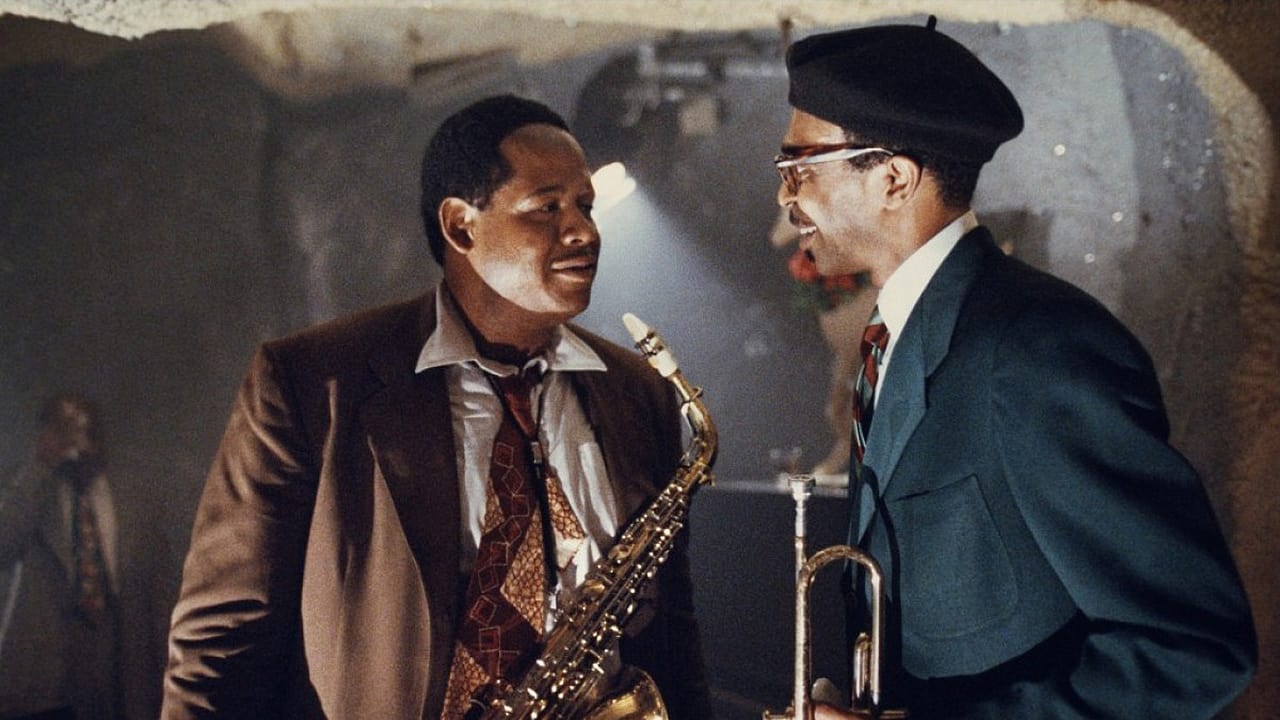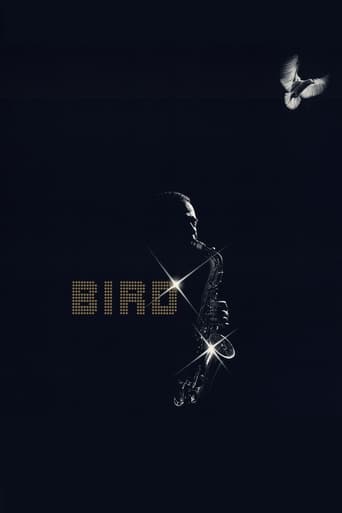

Miles Davis said "You can tell the history of jazz in four words: Louis Armstrong. Charlie Parker." I bet Armstrong is the one all jazz non-experts will immediately think of... and I'm no jazz expert.I wish I was but I'm not... but what even my feeble ear could gather from Clint Eastwood's "Bird" is that Parker's music was jazz all right but something more... or let's just say something else. It doesn't exactly ring a bell but it reminds me of the kind of music we hear everyday, it's modern but jazzy enough to fly above today's modernity. The word "Bebop" wasn't used in the film, I got it from Wikipedia but I don't want to be technical in a field I don't master. I'll say with all humility that I liked the music, no matter the branding.But it's one thing to make a movie about a musical genius and another to show you the psychological struggles of the artist. Oh, he wasn't misunderstood and his talent was acknowledged by his peers but the man, how to put it, took himself in a path of self-destruction that is hard to understand. The film doesn't imply that the drugs he took to ease the pain of his ulcers influence his style but they didn't impair his talent either, substance abuse was as much part of his legend as the cymbal thrown at his feet in that humiliating day where he couldn't adapt to the chords changes of tunes.The flying cymbal is used as a poetic leitmotif symbolizing Bird's epiphany, the pivotal moment where he decided to work his way out, not to become the best, but to be able to adapt to every possible tune. I don't know what it means technically but I can tell it means a lot of work, in fact, the kind of work that is so overwhelming in content that it ends up opening new breeches of creativity. Parker would become so good he'd invent new forms of improvisations, new sounds that were pivotal in the evolution of jazz music. And he was loved and admired by his peers, the audience and the woman who was his number one fan, Chan Parker. The relationship between Chan and Charlie is like nothing you've seen before, it's so complex and unpredictable that it can only be real, it's full of heart, passion, tragedy and the same dedication to music. She knew him from a friend, "is he cute?" she asked, "no, but you're gonna like him". I said I was no musical expert but sometimes, I could just tell how good Parker was from the eyes of Chan, he had won her from the start and the courting phase of their relationship was only a matter of 'how to put it'. Chan was still frustrated that a man with such a capability of creativeness could be so lacking in basic interactions. But there's no doubt he's the man of her life, no matter how many conquests he had. And that's a key aspect of Parker's life, people 'forgave' him, drugs, women, coming late, not honoring his schedules, if anything, his talent was his one saving grace. And Dizzy Gillespie (Joe E. Wright), third major 'player' in the film, realizes Parker is destroying himself with drugs and lack of structure, but he also knows that jazz is the kind of music that needs these destructive souls, he knows Parker will die earlier, and will be a legend, but Bird's a martyr while he's a reformer, jazz needs both, constructors and "deconstructors", leaders and drifters, music needs rules and freedom.And "Bird" is a fascinating non-linear immersion in the drifting of one of jazz' most blessed souls, from his spectacular debut to his slow downfall and the way he never ceases to attract crowds and fans, there's a wonderful sequence set in the Old South where he took a Jewish saxophonist Red Rodney (Michael Zelniker) and presented him as an albino, it's for touches like this or the jazz playing during the Jewish wedding that you realize how life isn't a matter of the number of years you lived but how they're lived. When Parker's own life ends, the coroner states his age at 64, he was thirty years too many, but many lives are longer yet with a lesser legacy.I said that I didn't want to use data from websites for this review but one bit of information I found interesting is that there was no visual footage of the artist, so Eastwood had to use recordings and adapt them electronically to the movie so the sound we could hear would really come from Parker's old records (some borrowed from Chan Parker herself). That's how te film won the Oscar for Best Sound and it says a lot about the perfectionism that drove Eastwood, you know when he makes personal movies, he always hits the right chord, ever since "Play Misty for Me", Eastwood showed that he took music personally and the film ends with a fitting dedication to all the musicians in the world.I shouldn't say musicians in the world, because sometimes musicians recreate the world through the movement of their fingers, lips or the infinite brain capacity to adapt, Parker was known to have an intellectual approach to the music and even without perceiving it, I could understand it... and admire it. "Bird" is a movie that can make you feel such abstractions and I think it has a lot to do with the powerhouse performances of both Forest Whitaker and Diane Venora, snubbed by the Oscars and I mean it."Bird" is a rather dark film, mostly set at a nighttime but there's a fire burning inside, and for all the sadness carried in Parker's eyes, we know that there's joy and lust for life devouring his heart. Time to end this review before I sound too corny, but watch "Bird" is a solid jazz drama and a fine tribute to one of the best...
... View MoreI feel as though the film did not do justice to the musically phenomenal life "Bird" went through. He was one of the most influential Jazz musicians crating an entire style of music. Which i felt was not portrayed fully. As one of the comments i've heard before stated "it seemed they had a choice between Charlie Parker as a musical genius or Charlie Parker as a junkie and they chose junkie."I felt as though the musicians playing the bird solo's did a bad job reflecting his "sound." As in Charlie Parker had a sound that filled up an entire room with complicated be-bop phrasings and with a blues background. While the musicians just had him playing fast notes most of the time which was sometimes difficult to hear over back ground noise, very "unbird like".However i did enjoy moments of the film, that showed even Charlie Parker had to play some weird gigs.My last point is that it felt as though Chan Parker was portrayed as a stable part of bird's life, and was one of the central idea's of the film. As in the love story between him and his wife, with a love hate relationship. Which i think could have been less focused on and centralized more around Charlie Parkers music.i do understand that Chan actually helped the script writer to write the film so it may have been a somewhat biased perspective.
... View MoreThe music in here is excellent and makes jazz appealing even to a non-jazz enthusiast like me. It better, because that's what the subject of the film is: jazz, and Charlie Parker, in particular. "Bird" was his nickname, and Parker was a good subject matter for a film - not a pleasant subject most of the time, but for jazz fans the man is a legend.I thought the acting was good, especially by the two main people: Forest Whitaker, playing Parker, and Diane Venora as wife "Chan." My major complaint was that it was too long. To make a film over 160 minutes when much of it is a "downer" it tough to sit through. It's generally a story about what can happen to a man who is addicted to drugs, which is what happened to this giant of jazz. That's the part of fhis life that is emphasized,, so it makes this movie a very long, sordid tale, not a happy one. Unless one is a big jazz aficionado, one viewing of this would be plenty.
... View MoreClint Eastwood's direction was very suitable for the material in this film, dealing with subjects he cares much about (music, loners, risking on the edge), and his handle on Bird, for my money, was wonderful. It's not an easy film to take, and it asks a lot from one in the viewing (it's a big film, with a plot complex, but not confusing, but is rewarding for those with a good interest Charlie Parker and the days of 40's-50's jazz. It's arguable whether there might be flaws in some of the uses of symbolism or bits of dialog in Joel Oliansky's script. But it's strong points - Forest Whitaker's major breakthrough in the title role; the bountiful and superb collection of Parker songs on the soundtrack (with a fine score by Lennie Neuhaus); a keen eye for getting the atmosphere and lighting right by Eastwood - are worth the viewing. Like most films about musicians with demons in the back of their heads (i.e. Ray, The Doors, even Amadeus), there is a level of possible melodrama that has to be crossed. With Bird, Parker is an interesting subject with this, and is ultimately shown well to be redeemed by the music. Likely to become more appealing, or at least easier to take on a second viewing, Bird is a solid, inspiring movie, with a kind of feeling to it that is unique. A+
... View More